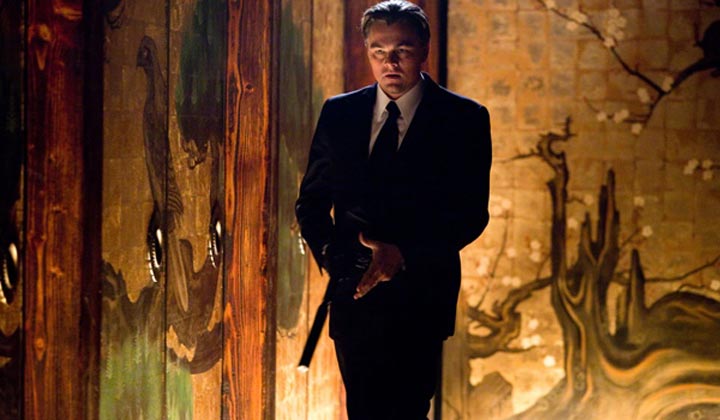Christopher Nolan’s follow-up to his billion-dollar grossing The Dark Knight has long been the film on which we’ve all pinned our movie-going hopes this summer. Does it disappoint? Not. One. Bit. To reveal too much in writing about it would be to spoil what is not just the film of the summer but perhaps the film of the year, especially given the outstanding job Nolan and his marketing team have done in shrouding Inception in a veil of mystery from day one, teasing at its secrets via a series of stunning if reasonably oblique trailers.
Nevertheless, there are a few things you can know. Leonardo DiCaprio is Dom Cobb, dream thief and expert in the art of extraction, capable of entering the sleeping minds of others and pulling from them their most valuable corporate secrets via shared dreams. On the run from the US authorities, unable to return home to his two young children, Cobb is offered the opportunity to clear his name by Ken Watanabe’s shady businessman Saito. His task, not to extract information from someone’s subconscious, rather to plant an idea — “the most resilient and powerful parasite” — into the mind of rival industrialist Robert Fischer (Cillian Murphy). But interception, as it’s called, requires going far deeper, in order to imbed an idea into the subconscious so the dreamer actually believes it’s his own.
To aid him in this, Cobb assembles his very own dream team: Arthur (Joseph Gordon-Levitt), his regular Point Man and the ying to his yang; Tom Hardy’s dandyish Forger Eames who excels at malleable personas within the dream state; and Dileep Rao’s Chemist whose powerful sedatives help prise open the realms of the subconscious, allowing access to dreams within dreams. To create the Escher-like dreamscapes into which Murphy’s mark will be pulled, Cobb hires Ellen Page’s architecture student Ariadne, whose namesake in Greek mythology helped Theses find his way out of the labyrinth. But Ariadne’s no fool and quickly discovers Cobb’s dirty little secret: that he’s unable to prevent his wife, Mal (Marion Cotillard), from rising out of his subconscious to sabotage his work. In fact, Cobb and Mal’s hostile and fractured relationship is at the very heart Inception, which, despite its globe-spanning plot, intricate narrative, awe-inspiring action set pieces, and fantastical central conceit, is a story of love and of one man’s obsession, with DiCaprio playing another of Nolan’s troubled leading men who, much like Bruce Wayne or Memento’s Leonard, remains haunted by his past to the detriment of his present.
The film lays out the rules of the dream state upfront and with minimum fuss and scientific babble. If you die in a dream, you wake up. If you die in a dream within a dream, you wind up in limbo, neither dead nor alive. Nolan, too, eschews the surrealism of other dream-related movies for something more real and lucid, and, for the most part, solid, and even edits his story to adhere to the rules themselves. In Memento, there were no establishing shots because Guy Pearce’s character never knew where he was. Here, characters bounce around without seeming to travel. Scenes begin and end without warning, just like in a dream.
As Cobb sets his elaborate plan in motion, the film’s second half interweaves a series of sensational dream sequences into one seamless whole, filling the frame with never-seen-before images and moments of dazzling originality, Nolan’s preference for practical effects over CG bringing a degree of believability to the action that no amount of digital wizardry can rival or replicate. There are gunfights, a snow-covered-mountain-top battle, fisticuffs in zero-G, a freight train barrelling down a rain-lashed LA street, and much more besides. But Inception isn’t your typical brainless summer entertainment in spite of its release date. Yes, there are thrills. And chases. Both foot and vehicular. Things explode. Buildings collapse. Whole city blocks flip over on themselves. Yet Inception isn’t determined by spectacle. Every set piece, each moment of jaw-dropping action adds to the story Nolan’s telling, as seemingly random events ripple and coincide and connect in unimaginable ways. DiCaprio, too, is superb, his fraught, emotionally-charged performance anchoring the film through shifting states of reality, ably assisted by a pitch-perfect supporting cast whose characters subtly change depending on whether they’re in the dream world or not.
Part heist movie, part Matrix, part Bond, Inception is, nevertheless, very much its own beast, a dazzling tour de force of imagination and ingenuity that has, justifiably, earned him comparisons to Kubrick. But Nolan’s his own man. And Inception is his masterpiece. Cerebral, complex, and challenging, it’s a film that asks much of its audience, and for some that might be asking too much; at times it makes Memento’s narrative structure look as simple as C-B-A. And as with any Nolan film you really must pay close attention to absolutely everything from the get-go, because while there’s no obvious M Night Shyamalan-style twist ending, there’s more here than meets the eye. What is certain, though, is that the debate will rage and run. And you will need to see this at least twice.
As Hardy’s character remarks to Gordon-Levitt’s, “Don’t be afraid to dream a little bigger, darling.” It’s a throwaway line, in the midst of a large-scale action sequence, but it’s one that could easily be read as a challenge to his fellow filmmakers, both in Hollywood and around the globe, to step up to the plate and try harder. With Inception, Christopher Nolan’s not only raised the bar, he’s changed the entire game.

4 comments:
On the one hand there’s your glowing review. On the other, Cineworld are telling me to ‘See this if you liked Jumper (2008)’!
Who to believe?
I can't believe you're even asking that question...
I'm abstaining until I've seen the film. Very much looking forward to your expanded thoughts!
It's as spoiler-free as possible. Even so, it might be best to wait.
Post a Comment